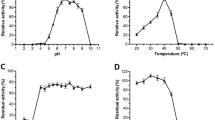Abstract.
A highly alkaline endo-1,4-β-glucanase (Egl) was purified to homogeneity from a culture broth of alkaliphilic Bacillus sp. strain KSM-N252. The optimal pH for activity was as high as 10, and the optimal temperature was 55°C. The molecular mass and isoelectric point were around 50 kDa and pH 4.2, respectively. The enzyme hydrolyzed carboxymethyl cellulose in a random fashion. Unlike previously reported Egls, the enzyme was highly active on p-nitrophenyl cello-oligosaccharides and acid-swollen cellulose, and its activity was stimulated by cellobiose at high concentrations. The entire gene for the enzyme contained a 1,476-bp single open reading frame encoding 492 amino acids, including a 29-amino-acid signal peptide. The mature enzyme (463 amino acids: 51,174 Da) exhibited moderate homology to other family 5 alkaline Egls. In the C-terminal region, a carbohydrate-binding module that belongs to family XII was repeated. Furthermore, four and six repeats of Pro-Pro-Ser/Thr-Glu/Asp-Pro-(Glu) were found immediately before the first and second carbohydrate-binding modules, respectively.
Similar content being viewed by others
Author information
Authors and Affiliations
Additional information
Received revision: 25 May 2001
Electronic Publication
Rights and permissions
About this article
Cite this article
Endo, .K., Hakamada, .Y., Takizawa, .S. et al. A novel alkaline endoglucanase from an alkaliphilic Bacillus isolate: enzymatic properties, and nucleotide and deduced amino acid sequences. Appl Microbiol Biotechnol 57, 109–116 (2001). https://doi.org/10.1007/s002530100744
Received:
Accepted:
Issue Date:
DOI: https://doi.org/10.1007/s002530100744




